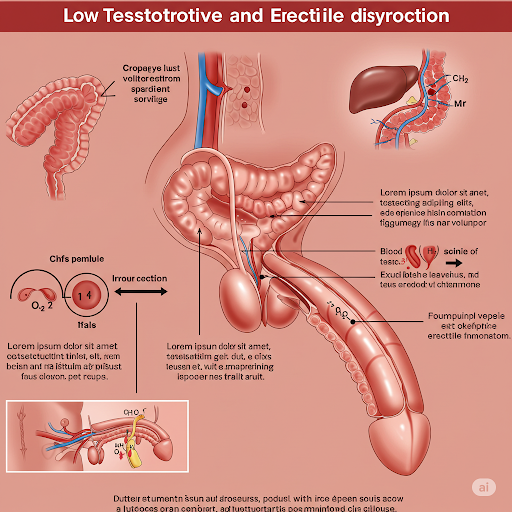Understanding the Hormonal Foundation of Male Sexual Health
Testosterone — often referred to as the “male hormone” — plays a critical role in a man’s sexual health. It influences not only libido and sexual performance but also energy levels, muscle mass, mood, and fertility. When testosterone levels drop, one of the most noticeable symptoms for many men is erectile dysfunction (ED).
But how exactly are these two conditions connected? Can low testosterone cause ED — or are they simply symptoms of a deeper issue? In this article, we’ll break down the science behind testosterone’s impact on sexual function and what men can do to restore hormonal balance naturally and safely.
What Is Testosterone?
Testosterone is the primary androgen hormone in men, produced mainly in the testicles. It regulates:
- Sex drive (libido)
- Bone density
- Muscle strength and mass
- Red blood cell production
- Fat distribution
- Mood and cognition
- Sperm production and fertility
Normal testosterone levels vary between 300 to 1,000 ng/dL, and levels naturally decline with age — usually around 1% per year after age 30.
What Is Low Testosterone (Low T)?
Low T occurs when the body’s production of testosterone falls below healthy levels. This condition is also known as hypogonadism. Symptoms of Low T may include:
- Decreased libido
- Fatigue and low energy
- Loss of muscle mass
- Mood swings or depression
- Difficulty concentrating
- Reduced body hair
- Erectile dysfunction
While some of these symptoms overlap with ED, it’s important to understand that not all cases of ED are caused by low testosterone, and not all cases of Low T result in ED.
How Testosterone Affects Erections
An erection is a vascular and neurological event, but hormones like testosterone play a key supporting role. Testosterone helps maintain the function of the tissues involved in erections, and it also influences the release of nitric oxide — a molecule that relaxes blood vessels in the penis to allow blood flow.
Without enough testosterone:
- Sexual desire often drops
- The ability to get aroused weakens
- Nitric oxide production declines
- Erections may become weaker or harder to maintain
A 2004 study published in The Journal of Clinical Endocrinology & Metabolism found that men with low testosterone were more likely to suffer from ED, and treating the deficiency often improved both libido and erectile function.
Causes of Low Testosterone
Several factors can contribute to low testosterone levels, including:
1. Aging
Testosterone naturally declines with age, but some men experience a sharper drop than others, leading to symptoms of Low T as early as their 30s or 40s.
2. Obesity
Excess body fat — especially belly fat — leads to higher estrogen production and suppresses testosterone.
3. Chronic Illness
Conditions like diabetes, liver or kidney disease, sleep apnea, and metabolic syndrome are associated with lower testosterone levels.
4. Stress and Poor Sleep
Chronic stress raises cortisol, which competes with testosterone and can interfere with its production.
5. Substance Use
Alcohol, anabolic steroids, and opioids can all negatively impact testosterone production.
6. Testicular Injury or Disease
Damage to the testes or pituitary gland can disrupt hormone signaling.
Diagnosing Low Testosterone
If you suspect Low T is contributing to your ED, the first step is getting a blood test, usually performed in the morning when testosterone is highest.
Your doctor may check:
- Total testosterone
- Free testosterone
- Luteinizing hormone (LH)
- Prolactin
- Estradiol
This helps determine if the issue is primary (testicular) or secondary (pituitary/hypothalamus related).
Treatment Options for Low Testosterone
1. Testosterone Replacement Therapy (TRT)
If confirmed, your doctor may suggest TRT in one of several forms:
- Injections (testosterone cypionate or enanthate)
- Topical gels or creams
- Skin patches
- Pellets implanted under the skin
TRT can improve libido, energy, and erections, but it’s not for everyone. It may:
- Reduce fertility
- Require lifelong treatment
- Increase red blood cell count
- Worsen certain prostate conditions
It’s crucial to undergo TRT under medical supervision only.
2. Natural Ways to Boost Testosterone
If your levels are borderline low or you want to try lifestyle changes first, these methods may help:
🥦 Improve Diet
- Eat healthy fats (avocados, olive oil, nuts)
- Get enough zinc and vitamin D
- Reduce sugar and processed foods
🏋️♂️ Exercise Regularly
- Resistance training is especially effective
- Avoid overtraining, which can have the opposite effect
😴 Prioritize Sleep
- Aim for 7–9 hours per night
- Treat sleep apnea if present
🧘 Manage Stress
- Meditation, breathing exercises, and mindfulness help lower cortisol
🚭 Quit Smoking and Limit Alcohol
- Both have been linked to lower testosterone and worse sexual performance
Is Low Testosterone Always the Cause of ED?
Not necessarily. ED can also be caused by:
- Poor blood flow (cardiovascular issues)
- Nerve damage (from diabetes or injury)
- Psychological factors (performance anxiety, depression)
- Medications (antidepressants, blood pressure drugs)
A comprehensive evaluation is key to identifying the root cause and finding the most effective solution.
A Balanced Approach to Sexual Vitality
Testosterone is a major player in male sexual health, but it doesn’t act alone. Addressing ED often requires a multi-faceted strategy — optimizing hormone levels, improving lifestyle, managing stress, and sometimes using medical treatments.
If you suspect low testosterone is affecting your sex life, talk to your doctor. With the right diagnosis and plan, you can reclaim your energy, libido, and confidence.
